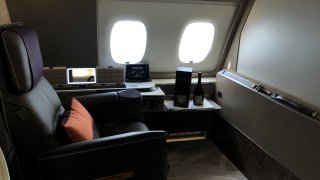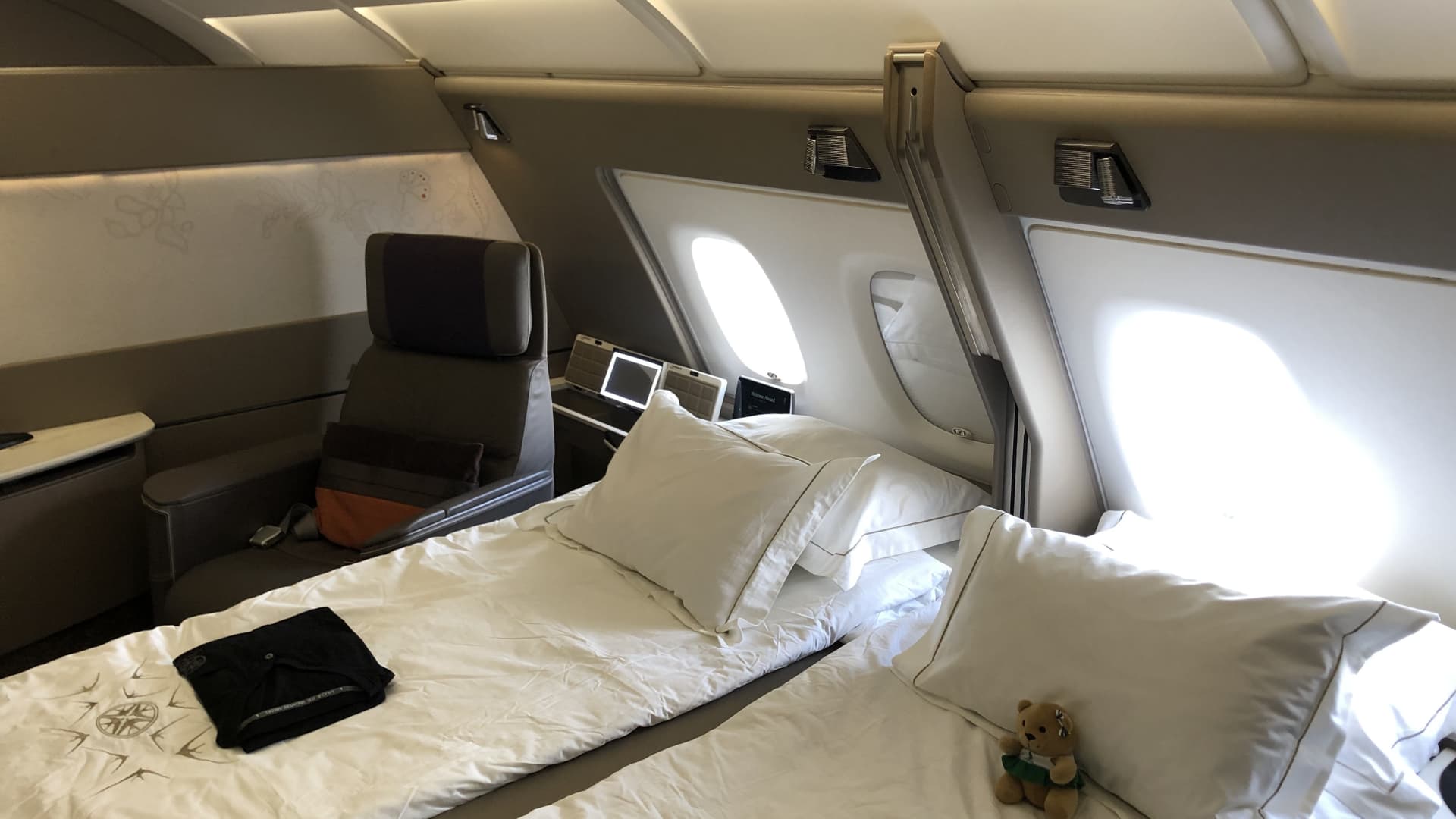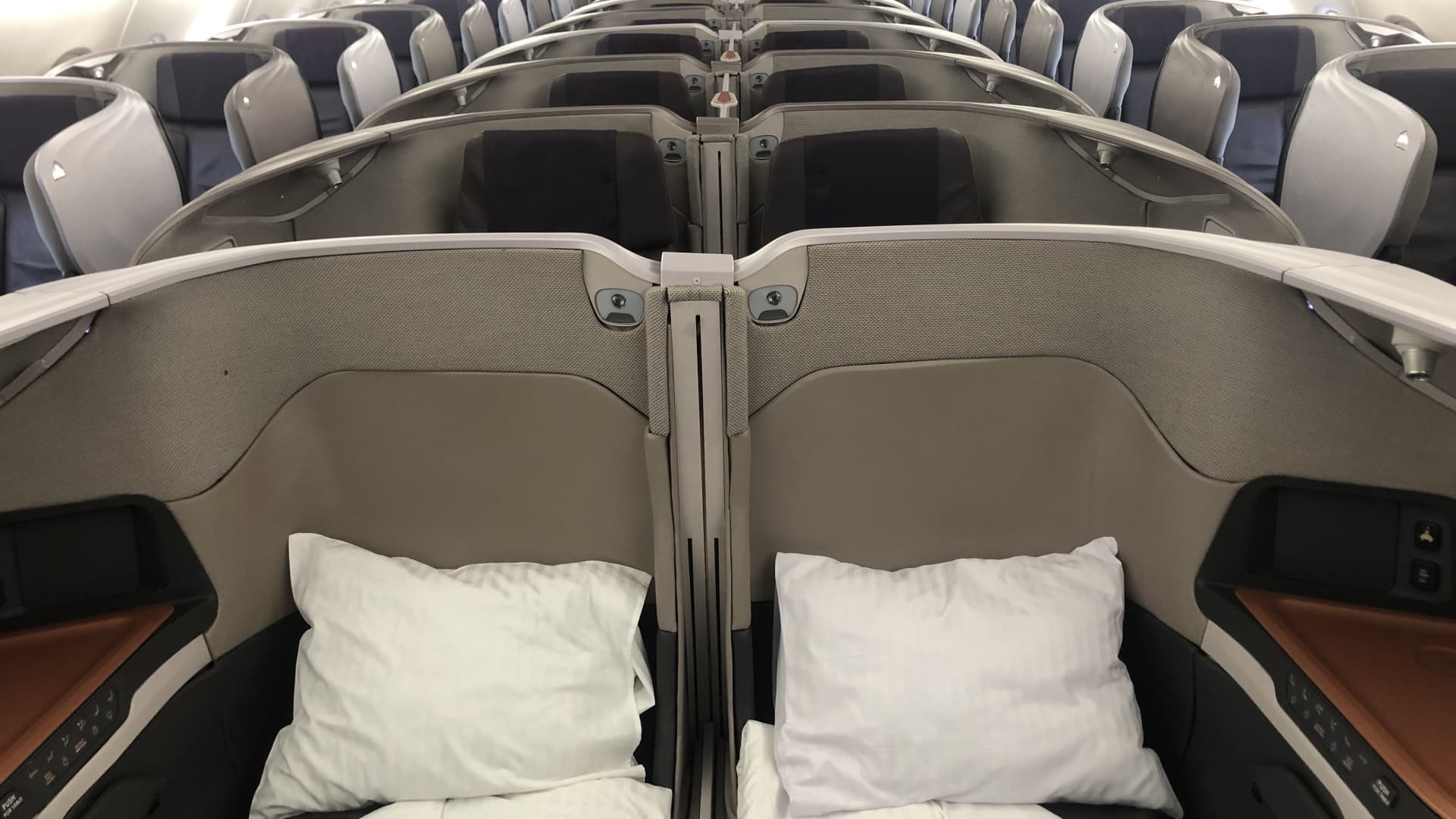
- International travel demand is recovering after a more than two-year Covid pandemic lull.
- Airlines are deploying their choicest cabins in the hope of getting high-paying customers to shell out for more space on board.
- Airline executives expect to pass along large amounts of increased fuel costs to customers.
Singapore Airlines this week unveiled its highest-end offering in the U.S: first-class suites that feature a bed, a swivel chair, 32-inch touch screen and a desk adorned with an orchid. They are each 50 square feet, and there are two bathrooms for the six passengers.
It's a bet that travelers are willing to shell out for luxurious cabins after two years of Covid pandemic lockdowns that devastated travel demand. Other airlines are taking similar steps with revamped cabins. They were able to do some upgrades faster during the pandemic when they didn't need as many planes.
A roundtrip ticket in one of the Singapore Airlines suites from New York to Singapore, with a stop in Frankfurt, Germany, is listed on the company's website at $17,143.37, including tax, for early May. One of the 78 new business-class seats on the A380 that convert into 6½-foot beds on the same dates are $6,362.87. Both cabins are on the upper deck of the superjumbo plane.
Passenger demand for both upper-deck cabins has been strong, said Joey Seow, Singapore Airlines' regional vice president for the Americas. Business-class seats on the planes are selling out before the 343 economy seats, a reversal of a pre-pandemic trend, he said.
"Normally, people would choose to go for economy class because it's cheaper," Seow told CNBC aboard the A380 before it departed for Frankfurt on Monday evening. "We see that more and more people are prepared to pay for that space."
Airlines around the world are hoping to benefit from the trend. It's key for airlines as they try to return to profitability while facing new challenges, such as a labor shortage, a recent surge in fuel prices, new Covid-19 variants and Russia's attack on Ukraine.
Money Report
Premium outperforms
Over the last decade, airlines have looked for new ways to upsell passengers on more spacious seats, whether for front-of-the-plane suites and new business classes or premium economy, which is a roomier seat with more amenities that sits between standard coach and the front of the plane.
With business travel demand still about 40% below 2019 levels, so-called premium leisure travelers are especially important as a way to grow revenue again.
"We had originally thought that people would only pay if their company was paying for these products and services, Delta Air Lines President Glen Hauenstein said at a JPMorgan industry conference earlier this month. "What we found in the pandemic is there is a wide appetite from consumers who want to sit in better products and services."
He said Delta wants to expand those offerings in the future.
"The margins are significantly higher in the premium products, and that's really where we're heading as an airline," Hauenstein said.
Rival JetBlue Airways has made its Mint business class a central part of its new New York to London service, which it expects to expand with flights from Boston in the coming months.

Delta's offering of premium seats is up proportionally versus 2019, partially because the airline has retrofitted some of its older planes with more spacious seats, said spokesman Drake Castaneda.
Carriers are banking on trans-Atlantic travel particularly this year, since several countries on both sides of the ocean have loosened Covid lockdowns in recent months, after two years of weak demand.
Growing schedules
Now carriers are ramping up for a big summer, bringing some of their largest jetliners that they used for domestic routes as a pandemic salve, to international routes that command much higher fares.
Airlines' trans-Atlantic capacity in July, measured by seats, is down 10% from pre-pandemic July 2019 – but it's up more than 170% from last year, according to flight data firm OAG.
United said it expects its trans-Atlantic capacity in July to be up 20% from 2019. It is flying Boeing 767-300ERs that have high numbers of premium seats — 46 Polaris business class, 22 premium economy, 43 extra legroom and 56 standard coach — from Newark, New Jersey, and Boston to London.
Fares are also up. Fare-tracking site Hopper said international flights are currently $810, up 25% from the start of the year when omicron infections surged during what is normally a seasonal lull and 2% shy of 2019 levels, while domestic fares have risen 40% from the beginning of the year and are up 8% from three years ago.

"At this point it doesn't appear that higher airfares are having a significant effect on premium demand," said Henry Harteveldt, a former airline executive and founder of travel consulting firm Atmosphere Research Group. "The premium customer will be the last to feel the impact of higher air fare simply because they have the means to afford premium travel."
Long-haul trans-Pacific demand has been slower to return, particularly in China due to strict Covid lockdowns.
Singapore's Seow said looser travel restrictions in other parts of Asia are helping spur new bookings, but travelers are also showing interest in its shorter legs, like JFK to Frankfurt on the A380.
"We hope that with a better product we can cater to more of the customers who in the past may not have chosen us," he said.
Less margin for error
Carriers were able to experiment more freely during the pandemic. Historically low travel demand and a patchwork of countries that opened their borders sent airlines looking for opportunities to increase revenue where they could.
Now, with U.S. jet fuel prices up and uncertainty around Russia's war in Ukraine and its impact in Eastern Europe, airlines have less margin for error. Airspace closures have also forced some carriers to fly longer routes to avoid Russia.
While United is still planning a robust trans-Atlantic schedule, last week the airline said it won't fly nonstops between Washington's Dulles and Berlin, Newark and Prague or Denver and Tokyo as planned.
"United makes regular adjustments to our schedule in response to a number of factors including demand, costs and resources," the airline said in a statement. "We look forward to bringing these routes back into our network as soon as the market allows."
Some airlines are also constrained by aircraft. American Airlines for example, last month said it would further trim some international routes such as Seattle-London due to a pause in Boeing 787 Dreamliner deliveries.
Some travelers are opting for more well-trafficked Western European destinations over Eastern Europe since the war broke out.
"We certainly have seen a dip in bookings for Eastern Europe and a rise in Western Europe," said Kendra Guild, director of product and operations at SmarTours, which offers packages all over the world.
She said customers aren't canceling but bookings to the Czech Republic, Poland and Croatia have dropped while countries including Portugal, Spain and Ireland are relatively strong.






